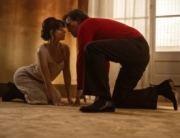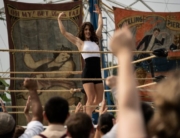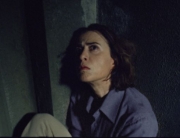For a film that chronicles the climactic peak and dismaying decline of Der Kreis, one of the pioneering gay rights organizations of 20th century Europe, Stefan Haupt’s The Circle is rote and unforgivably bland. Though it evokes the well-known Swiss regard for precision and punctuality, the film rarely dares to veer off its fixed storytelling tracks. Unlike another recent LGBT historical narrative, The Circle severely lacks a discernible sense of Pride.
Though Switzerland never enacted a law similar to Paragraph 175–one that criminalized homosexual acts and was a fundamental principle of the Nazi regime–gay citizens were nevertheless a closeted minority. With the launching of the gay erotica magazine Der Kreis (or, The Circle) in 1951, men in Switzerland and abroad were offered an outlet for their same-sex desires, as well as a community of accepting peers. The underground periodical, printed in German, French, and English, boasted more than 2,000 international subscribers and was headed by Karl Meier, an actor in the Swiss ensemble Cabaret Cornichon, who served as lead editor under the pseudonym “Rolf.”
But rather than focusing specifically on Rolf and the unprecedented establishment of the magazine, the film instead centers on two of its contributors, Ernst Ostertag and Röbi Rapp. Cutting between modern-day interviews with Ernst and Röbi and dramatized recreations of the couple’s early lives, The Circle depicts the origins of a devoted relationship between the stoic schoolteacher and his cross-dressing, cabaret-singing lover.
Fictionalized versions of Ernst and Röbi are brought to subdued existence by Matthias Hungerbühler and Sven Schelker, respectively. While Hungerbühler, an actor in his mid-30s, boasts the mature features of a man well into his fourth decade, Schelker’s cherub cheeks and bright-eyed gaze recall a 20-year-old Chris Colfer from season one of Glee. Yet in real life, the activist partners are actually the same age. These distracting casting choices are only the first of the mounting issues.
Besides the murder of an openly gay Swiss composer by an 18-year-old rent boy, the docudrama also details the imminent repression of Zürich’s queer community by the Swiss police. These youthful male hustlers, arriving from neighboring countries to capitalize on the city’s fledgling queer scene, cause havoc and panic, prompting police raids of clandestine gay clubs and bars. And yet despite the setbacks, the Der Kreis organization attempts to carry on, led by Rolf and his band of furtive queer compatriots.
Portrayed by Stefan Witschi, Rolf functions as an abiding, mundane tether for the gay community. He responds to letters from readers and offers sage advice to his wayward contributors. When Rolf learns of Ernst’s occupation as a schoolteacher, he cautions, “Our kind and school: bad combination.” Flavorless lines like these, along with dull, unimaginative cinematography and precise, wooden stagings permeate the film, leaving Haupt’s uncommon docu/narrative filmmaking technique as one of the few marked attributes.
The real-life Ernst and Röbi, who withstood anti-gay government repression and continuously fought for LGBT rights before becoming Switzerland’s first legally married same-sex couple in 2003, remain blissfully smitten with each other. Coy interviews with the moonstruck octogenarians are interspersed, dicing the narrative as they reflect on their youth, their search for an accepting community, and their struggles to affect change and a sense of safety for all queer Swiss citizens.
Unfortunately, though the tactic of merging the documentary and narrative formats aims to engender a striking authenticity, Haupt’s attempts fall short. Rather than enticing viewers with a flowing series of anecdotes, the director offers a tedious, jarring juxtaposition of disconnected scenes that only manages to distance viewers. Mostly, The Circle renders itself a monotonous, unfeeling merging of played-out caricatures and ineffective commentary. Whether out of fear of disrupting the clockwork proceedings of a filmmaking 101 seminar, or simply due to a lack of inspiration and vigor, Haupt submits a film that, unlike the subjects it portrays, is anything but groundbreaking.















